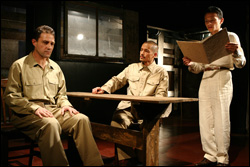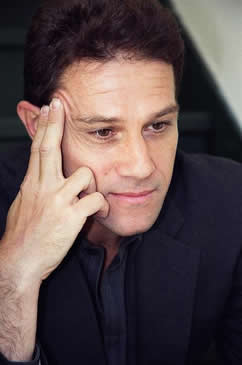His name is Christian Baskous and most recently he narrated my first novel, THE PEN NAME. “[It’s] a choice little nugget of ‘devil’s-bargain’ thriller fiction,” Christian said of the book. We talked over email, and while I couldn’t hear his voice, I’ve heard it before on recordings. I could imagine him delivering the lines in his deep, resonant timbre.
Christian is quite the voice talent with a range from juvenile to senior. He can speak a variety of dialects: American English, British English, South African English; Cockney, French, German, Greek, Indian, Irish… even Scandinavian. The German dialect served him well narrating THE PEN NAME. “I really did have a good time recording it,” Christian said.
I was so thrilled with his reaction to THE PEN NAME and so fascinated by his work I decided to sit down with Christian for a little chat. And while you won’t be able to hear him answer the following questions, just imagine that everything he says... sounds like this: Play Audio...
DAVID JACOB KNIGHT: Hey, Christian, thanks for taking time to visit the blog!
CHRISTIAN BASKOUS: Thanks, David. Nice to be here. It was this or Costa Rica. Honestly, I'm very flattered to have been on the team. Thanks for trusting me with your book.
DJK: So I’m dying to know more about the actual headspace you have to enter in order to narrate audiobooks--but first can you tell us a bit about the process? Take us through a typical recording session...
CB: Well, to start with, I'm preparing for a while before I get there. Something like your book, which is relatively involved, I'll read it through a couple of times just to get the sense of it. What's the author going for? What's the frame of reference? Is it a genre piece? Is it making some kind of comment on a particular style of book? Is it literary fiction?
Then I go through it more carefully, making notes, organizing an approach to playing the many diverse characters, doing whatever research is needed in terms of background or speech, accents, foreign language passages, what have you... Where's this guy from, how old's that one... how can you make them distinct from each other? Not every book requires this much prep but for a long book with lots of scenes and characters I might have to make lists of who's who, notes about how they talk. And I go over that, and the text itself, as much as I expect to cover in a given day's recording. Then I can show up at the studio fairly confident of what to do.
We'll start at the top and work through, stopping if there's some technical issue, or a misread word, or somebody wants to give some input. We punch-edit as we go along so the thing's taking shape as we do it, usually working about 5-6 hrs and finishing 3-4 hrs of recording in that time. It's really a very nice job once the process is rolling along: you're isolated in a comfortable, quiet room, wrapped up in your own and the author's imaginary world, sipping unlimited free coffee. Then it goes to the editors for a finer edit.
If it's a book I record at my own studio I have the luxury – up to a point – of reviewing the work, making adjustments, assembling my own rough edit... then I ship that to the producers for them to go over and find the little misreads I always do when I'm acting my brains out by myself.
DJK: I see you’ve done some acting. What are some of the hardest roles you’ve performed, and what are some of your tricks for getting into character?
 CB: Classic roles in theatre. It's much to assimilate, to learn, all at once; you're responsible for understanding every nuance of that very loaded verse text and also whatever work you need to do to sustain that character's life in the moment. Uncompromising realistic plays like Tennessee Williams. There's no trick with those. You just put your life on hold and work your ass off, living with that person, the character for a few weeks (or however long you work on it)... But all that's easy in the sense that you're motivated by the quality of the play, it's worthwhile. You're alive in the work. Working on TV can be hard because of the crazy pace. Soap operas are, for me, a trip down into a surreal hell of oversexed, power-mad vixens.
CB: Classic roles in theatre. It's much to assimilate, to learn, all at once; you're responsible for understanding every nuance of that very loaded verse text and also whatever work you need to do to sustain that character's life in the moment. Uncompromising realistic plays like Tennessee Williams. There's no trick with those. You just put your life on hold and work your ass off, living with that person, the character for a few weeks (or however long you work on it)... But all that's easy in the sense that you're motivated by the quality of the play, it's worthwhile. You're alive in the work. Working on TV can be hard because of the crazy pace. Soap operas are, for me, a trip down into a surreal hell of oversexed, power-mad vixens.DJK: I’ve always thought writing is comparable to acting, in that writers have to get into the heads of their characters. How does acting and narrating audiobooks compare? For example, do you practice some of the same routines getting into character?
CB: To me it's all acting... I don't know how else to approach it. The media are different obviously. But there are times when one's recording an audiobook – a narrative story, for example, when you're obliged to inhabit some persona the author's created – the demands are very much the same as if you were on camera. It's a mic, though, not a lens...You've got to find the inner life of that character, in a way that's germane to the medium, and really go for it. Commit emotionally. You can't hide. One should take the work that seriously, if the material supports it. Obviously though, you have to have a sense of how far you can go without it being too much, too big. And I don't have lines to learn when I do an audiobook... which is a little decadent.
DJK: Out of all the variety of scenes--action scenes, dialogue-heavy scenes, sex scenes, etc.--what types of scenes do you like recording most? (I bet it’s sex scenes…)
CB: No. Sex scenes are hard to do without everybody cracking up. Dialogue-heavy scenes are demanding, in terms of pace; especially when you're playing a room full of characters with different accents, all talking at once. It's physically impossible for one actor to play all the roles, pick up cues properly, and breathe. It's tough, anyway... but very satisfying when you get it right. Sometimes you can make a very strong character choice, and have it work nicely. That's very satisfying.
DJK: What is your absolute favorite part about narrating audiobooks?
CB: That would have to be the rock-star lifestyle, David. My private jet... the audiobook groupies hanging around the recording studio, feeding me grapes... it's like nineteen-sixty-eight all over again.
Truthfully, in those instances when I'm doing the recording and editing, and reading the book, it's as if I'm the auteur in a kind of ultra-low-budget cinema, where I have near-absolute control and play all the roles. And I enjoy that. Occasionally I'll hear something I did - for instance a section of a book I did recently where I play four members of the same family in a dramatic scene - and I'll say “Oh, that works nicely”; you forget it's just one guy. You don't get to do that in other media.
DJK: You seemed to have enjoyed working on THE PEN NAME. Who would you say was your favorite character to bring to life?
CB: The little boy with club feet, Owen. I never got to play Tiny Tim – any of those child-star roles - and goddam it, I'd have been great. Thanks for this opportunity, David, really... Eat your hear out, Freddie Bartholomew. Our engineer on the book liked what I did as the wife, Alice. I quite liked that character actually. Strong, but truly kind and devoted. Like my own wife.
DJK: Nice! We had a lot of fun with both of those characters too. Thanks again for joining us, Christian, and for your awesome work on THE PEN NAME!
CB: It was my pleasure, David. Thanks for having me.
To learn more about Christian Baskous’s work, visit his website: www.chrisbaskous.com. THE PEN NAME is now available as an audiobook on Audible, and also in ebook and paperback.





Enter to win a signed copy of THE PEN NAME over at Goodreads: http://www.goodreads.com/giveaway/show/66274
ReplyDeleteSo, be it about business, philosophical, religious or social reasons people get to share themselves best. Christian chat rooms
ReplyDelete